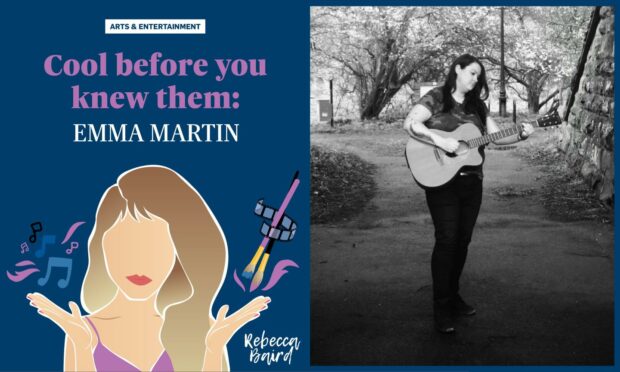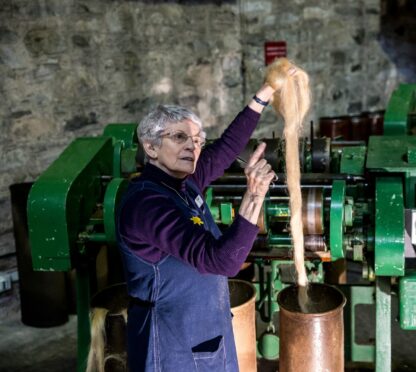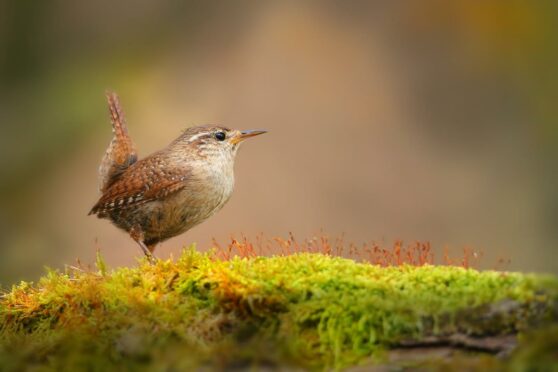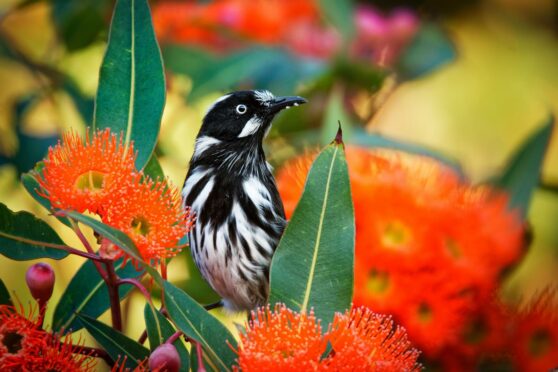Emma Martin may be traditional in musical style, but when it comes to lyrics, the songwriter isn’t afraid to ruffle some feathers.
After winning the Hands Up For Trad Award in 2017 for their song Kettle Bilers, about the husbands of Dundee’s female mill workers, Emma has been hard at work addressing the deep-rooted issues around gender and power in our society through song.
And the Dundonian folk musician’s latest venture – wryly titled Burd Song – aims to help female and non-binary survivors of domestic abuse “try and make something so terrible into something that’s beautiful”.
In Burd Song, a university project which won this year’s Making Waves award from Scots Women Inventing Music (SWIM), Emma combines their love of birds, songwriting skills and drive to empower those who have had their voices snatched away.
I caught up with Emma to find out more about Burd Song, and the impact it’s having on communities across Scotland.
Emma Martin: Reclaiming the word ‘burd’
Rebecca: You’re based in Glasgow now but you grew up in Dundee. Do you think the city influenced your songwriting and interest in gender norms?
Emma: Definitely. Dundee is exceptionally important to me. My granny was a weaver in the jute mills, my parents still live in Dundee and I visit a lot. So I think that the history of Dundee, especially from a female point of view, is so strong.
I am fascinated by the jute mills of Dundee and their connection to women, so I have ten songs written already about the mills, in a separate project to the one I’ve released this year – Burd Song.
Amazing! But yes, let’s talk about Burd Song. It isn’t just a pun on the Scots slang for women – it literally uses birds as its basis. Why birds?
I’d seen an article that was talking about how for years, everyone has just assumed that birdsong is from the males.
But female scientists are now coming in an recognising that it’s because there’s been a gender bias in who has done the previous studies – generally, because of the time, it’s been a lot more males doing it than females – and they’re actually incorrect!
And then obviously you have the derogatory terms for women, which tend to be “burds”, “chicks”, that type of thing.
So I thought: “Maybe we can reclaim this word a little bit.”
And there’s a large community aspect to this project too, right?
Yes. Going through lockdown, cases of domestic abuse were skyrocketing.
All I could think was: “Right now, I just want to do something, to create a small drop in the ocean that could help somebody who has experienced one of the worst things in life (abuse).”
We can use music, which is such a powerful tool, to try and make something so terrible into something that’s beautiful.
Birds are already self-made songwriting tools because you can use their actual songs, their descriptions, their folk stories – and you can try and identify with it. But I thought to really show that, the best way was to lead by example.
How so?
I went through abuse when I was 10. At the beginning of this project, I thought: “Now is the time to tell my story of that.”
Especially seeing at the moment, a lot of women coming forward and telling their stories. And I think it’s really important that we do that, so that more people feel they can share theirs as well.
Tell me about the process behind your own ‘Burd Song’, Stolen Flight.
So you have the story of the wren and the eagle, which is an old folk story which really resonates with me. The wren is the smallest bird, yet it can still be the most powerful – it’s sort of about how anybody has a chance to fight.
I took the wren, which is a bird that has always been my favourite, and I told the story of Stolen Flight, which is essentially the story of my own innocence being taken at a young age.
That’s kind of how the whole project came about.
So the birds help people to tell their own stories?
Exactly. Another bird I wrote about was the honeyeater – their songs have been lost because there’s so few of them and they mimic everybody else’s songs.
That something that somebody I was working with could identify in themselves.
They felt that in their relationship, they were losing their own identity, losing their voice. They could see it in the bird and that helped them open up.
If people can identify with a bird, they can talk through (their abuse) and they don’t have to give their names – they can just be “a sparrow” or “a kingfisher”.
How does it work on a practical level? People choose a bird – how does that turn into a song?
It’s a very person-centric process, so it can look like anything. I’m also very aware that I’m not a therapist, I’m not clinically trained. So I don’t want to open up anything somebody isn’t then able to cope with.
But basically they can share their story with me – as much or as little as they want. And I will then show them a whole bunch of birds that they can start to align themselves with, and we take it from there.
I’ll show them clips, images, stories – anything that can help to start the process.
It’s not me saying: “This is what I think you should do.” It’s more like: “What do you like, what kind of music and words resonate with you?”
Do participants need to be songwriters or musicians themselves?
Not at all. I think sometimes people go, “Oh God, I could never write a song!” But anybody can write a song. You’ve just got to have the right tools, and you maybe just need a bit of support, but it’s possible.
And it doesn’t matter if they don’t play an instrument because if they start liking a song, I can either play it for them, or if there’s an instrument they prefer, I’ve got a network of friends who are musicians who could play it.
So now the project is up and running, are there plans to expand it?
Yes, actually. I’ve been in touch with Rape Crisis Scotland, with their Edinburgh and Forth Valley offices. We’re going to have a launch next year and they’re really excited to start seeing how I can work with them and start empowering women who go through different stages of grief in those circumstances.
I think sometimes we’re a wee bit too shy – we think: “I should say that, I shouldn’t do that.” But in music, you can go for it.
It’s a good way to make a point resonate, and that’s what I believe in.
I also think people are liking that it isn’t just music for music’s sake – it’s music that’s got a meaning behind it.
What kind of music influences your own songwriting?
People like your Karine Polwarts, your Eddi Readers – they’re these strong, bold, Scottish women and they put things so eloquently in song that it’s hard to argue with. And it also gets stuck in your head because it’s a catchy song!
That’s what I want to do – go out there and shake up some things through folk music and community music.
What would you say is your mission in music then, if you have one?
Well, I’m playing in Glasgow next month and I know that my first song will be my new one, Deeds Not Words, because the first line is: “There’s a bomb I posted in a letterbox – did you read it?”
It’s quite harsh but it’s one of my favourites because because for me it sets the tone of what I want to do with music.
I’m not here to play it safe, I want to start – excuse the pun – ruffling some feathers.
Cool Before You Knew Them brings new artistic talent straight to Courier audiences. So you can say, “I knew them before they were cool.”
Emma Martin is playing at Room 2, Glasgow, on November 18. Burd Song is also currently part of the University of the West of Scotland Student Showcase 2021.
If you have been affected by any of the issues in this story, there are a number of organisations listed here which can help.
Related:



